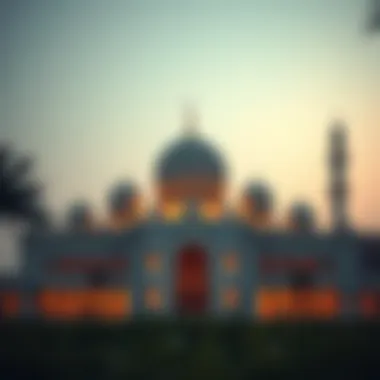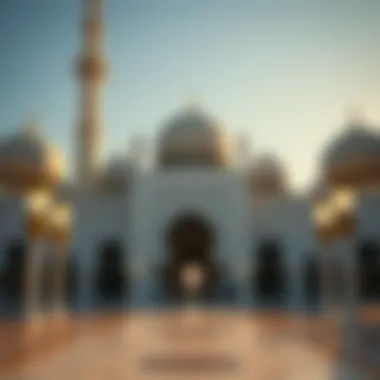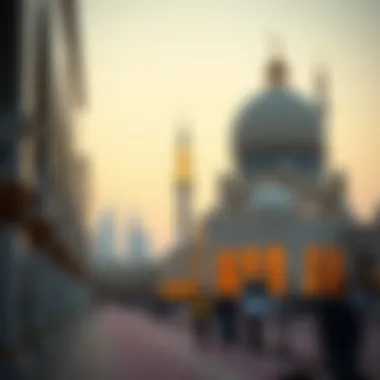Ramadan 2024 Dates and Significance in Dubai


Intro
Ramadan is not just a month of fasting for Muslims; it is an intricate tapestry of cultural and economic dynamics that shapes cities like Dubai. As we approach Ramadan in 2024, the significance of this period becomes particularly palpable in a place renowned for its rapid development and strategic investments. Observing the dates for Ramadan, which are expected to begin around the evening of March 10 and continue until the evening of April 9, we glean insights into how these 30 days impact various sectors in Dubai.
As the sun sets during this holy month, the atmosphere in Dubai transforms. Restaurants and hotels adapt their services to accommodate the pre-dawn meal, Suhoor, and the evening meal, Iftar, which breaks the fast. This shift in schedule has ramifications for tourism, business operations, and social customs that are essential for investors, property managers, and residents to understand.
Moreover, Ramadan serves as a bellwether for social interactions. The community comes together, sharing meals and traditions that bridge generational gaps. This strong sense of unity affects commercial activities and real estate ventures, inevitably impacting the strategies employed by investors looking to navigate Dubai’s unique market landscape.
Given these dynamics, the purpose of this article is to unravel the implications of Ramadan 2024 in Dubai from multiple angles. We'll examine how local customs are intertwined with market trends, investment opportunities, and the overall ambiance that inundates the city during this auspicious month.
Preamble to Ramadan
Ramadan stands as a beacon of spiritual reflection, cultural significance, and communal bond for Muslims around the world. In this article, we will focus specifically on how Ramadan 2024 unfolds in Dubai, exploring its multi-faceted importance.
During this holy month, the focus shifts remarkably towards spirituality, charity, and family. It’s a period where the community comes together for prayer, breaking fast, and engaging in charitable activities. In a city such as Dubai, known for its dynamism and diversity, Ramadan brings unique layers of meaning and experience.
Understanding the nuances of Ramadan can greatly benefit various stakeholders, particularly investors, homebuyers, and business managers, who need to be aware of the cultural and economic landscape during this period. This month is not only about fasting; it's about the comprehensive transformation that takes place in the rhythm of life, impacting sectors from hospitality to real estate.
With the holy month anticipated to start approximately on March 10, 2024, the excitement builds as communities prepare. The significance of knowing the dates helps those living and working in Dubai align their activities with the cultural and spiritual essence. Here, we will delve deeper into the religious context and global significance of Ramadan to set a comprehensive foundation for our discussion.
Understanding the Religious Context
At its core, Ramadan signifies the ninth month of the Islamic lunar calendar, a time dedicated to fasting, prayer, reflection, and community. For Muslims, it is a time when the Quran was first revealed to Prophet Muhammad, making it profoundly sacred. Fasting from dawn until sunset is a key tenet, promoting self-discipline and spiritual growth.
The act of fasting is intended to cultivate empathy for those less fortunate. Beyond abstaining from food and drink, it also entails refraining from impure thoughts and actions. Consequently, Ramadan encourages a heightened level of mindfulness and piety. This shift fosters a sense of unity, as families and fellow believers gather for prayers and meals, particularly the evening iftar.
Global Significance of Ramadan
Beyond its local significance, Ramadan resonates on a global scale, acting as a rallying point for Muslims around the world. More than just a month of fasting, it connects millions in shared traditions and values. Towns and cities across the globe see a transformation in their atmosphere as charities ramp up, community activities increase, and the spirit of giving takes center stage.
In many countries, including Dubai, businesses may adjust their services or offerings to cater to the needs of those observing the fast. For investors and companies, understanding these adaptations can provide strategic advantages.
The global interconnectedness of Ramadan showcases not just a religious observance but also offers valuable insights into human behavior, social connections, and economic activities. Whether through charitable initiatives or community festivals, the impact of Ramadan is felt far and wide, underscoring its importance beyond the individual and the local context.
Ramadan is an opportunity for faith, reflection, and community. The lessons learned extend beyond the holy month, shaping interactions and priorities for the year ahead.
Ramadan Dates in Dubai
Understanding the dates of Ramadan 2024 in Dubai is crucial, as this period not only shapes local religious practices, but also influences various sectors such as real estate, business, and tourism. Identifying the exact dates allows investors and business owners to prepare adequately, aligning their strategies with the rhythm of the holy month. As people fast and move into the spirit of Ramadan, recognizing these dates further facilitates community involvement and engagement.


Additionally, whether you’re a resident, a tourist, or someone looking into potential investments, knowing when Ramadan occurs provides valuable insights into how life in Dubai shifts during this sacred time. The implications of these dates echo throughout the city, transforming daily routines, corporate schedules, and even social customs.
Expected Starting Date
The anticipated start of Ramadan in 2024 is expected to be on the evening of March 10, lasting until April 9. This date, determined by the sighting of the moon, is one of the essential aspects of Ramadan. Participants of the month-long fast await the moon sighting, as the Islamic calendar is lunar. Generally, when the crescent moon is spotted, it marks the commencement of this significant period.
It’s notable that the announcement may come through various cultural avenues, including social media platforms or local mosques. Residents should keep an ear out, as the community resonates with excitement during this period. Frankly, the anticipation is palpable – as one waits eagerly for the religious awakening that this month ushers in.
Duration of Ramadan
Ramadan lasts for about 29 to 30 days, depending on the lunar calendar. In 2024, it is anticipated to conclude on the evening of April 9. Each day begins with a pre-dawn meal called suhoor, followed by fasting from sunrise to sunset. It is a time for reflection, prayer, and community bonding. The fast is observed rigorously, providing a unique communal experience as everyone synchronizes their meals and prayers.
As the days progress, the energy in Dubai shifts noticeably. You might see bustling markets in the evenings, as residents break their fast together, sharing meals and stories - a beautiful reminder of the essence of Ramadan. Therefore, knowing the duration aids everyone from business planners to social organizers, helping them structure events that complement this religious observance.
Eid al-Fitr: The Epilogue of Ramadan
Eid al-Fitr, which means 'Festival of Breaking the Fast', is a momentous occasion marking the end of Ramadan. In 2024, it is expected to be celebrated on April 10, though this too can depend on lunar sightings. This day is not just about ending the fast; it welcomes celebrations, community gatherings, and charitable acts.
On Eid, people gather in mosques to perform special prayers, indulge in festive meals, and give zakat al-fitr, a charitable donation meant to purify those who fast from any indecent act during Ramadan. This day reinforces relationships and community spirit, as families and friends come together to show gratitude and joy. Beyond its religious significance, Eid has developed into a cultural celebration, recognizable by unique culinary offerings and vibrant markets.
The conclusion of Ramadan with Eid al-Fitr signifies a broader community connection, with opportunities for businesses to thrive as celebrations see a surge in activity. Understanding this period is essential for those investing or working in Dubai, as consumer behavior shifts significantly around this joyous occasion.
"Eid al-Fitr is a time of joy, cooperation and human connection that brings people together across the cultural spectrum in Dubai."
Being aware of these dates helps to foster a deeper understanding of not only the religious importance but also the economic and social dynamics within the city during Ramadan.
Cultural Practices During Ramadan in Dubai
Ramadan is not only a month of fasting; it is a profound cultural phenomenon embedded deeply within the social fabric of Dubai. For investors, homebuyers, and real estate analysts, understanding these cultural practices is crucial, as they directly affect market behavior and community interactions throughout this holy period. The coexistence of spirituality and local customs during Ramadan in Dubai offers unique insights into its economic landscape and social dynamics.
Fasting and Its Significance
Fasting, or Sawm, during Ramadan holds exceptional significance in the lives of Muslims. It is a commitment, a spiritual journey that isn’t simply about abstaining from food and drink during daylight hours; it is a chance to cleanse the soul, build empathy for those less fortunate, and increase one’s connection to the divine.
In Dubai, this practice goes beyond personal reflection. Businesses and communities adapt to support the fasting population. For instance, you can often spot signs in various establishments indicating that they will serve food a bit later. This respectful gesture fosters a sense of harmony in a city bustling with diversity. Adjusting business operations allows for a smoother flow in commerce and encourages patience among consumers.
Iftar Traditions
As the sun sets, the air fills with anticipation for Iftar, the meal that breaks the fast. It is more than just a meal; it symbolizes the closing of a spiritual day and encourages community bonding. In Dubai, this is often celebrated with a lavish spread that includes dates and water, followed by a variety of traditional dishes such as Harees and Shorbat.
Impact on Dubai's Real Estate Market


The impact of Ramadan on Dubai's real estate market is multifaceted, intertwining cultural practices with economic dynamics. Understanding these nuances can provide investors and stakeholders with strategic insights to navigate the market effectively during this holy month. Ramadan is not merely a time of fasting and reflection; it’s also a period that influences purchasing behavior, market activity, and overall sentiment. The significance of this analysis lies in the opportunity it presents for investors to make informed decisions during a time when many overlook potential prospects.
Market Activity During Ramadan
During Ramadan, the real estate market often experiences a unique shift in activity levels. While some might expect a lull due to fasting and reduced working hours, history shows that the opposite can occur. Potential buyers and renters may be more inclined to seek new properties, motivated by the upcoming Eid celebrations, which often include family gatherings and social events.
Real estate agents might notice an uptick in inquiries as people aim to settle before the festivities commence. Additionally, lifestyle changes during this month can lead individuals to seek properties that offer more comfort and convenience, such as those located near community centers or with amenities conducive for family gatherings.
“Eid can act like a double-edged sword for the market—on one side, it pauses the momentum, but on the other, it ramps up interest as people look to refresh their living environments.”
Moreover, special events and community gatherings during Ramadan may encourage real estate exhibitions or open houses, providing a perfect platform for marketing properties. It is essential for developers and realty businesses to plan their events around these local practices to harness the energy and spirit of the month.
Investment Opportunities
Ramadan presents several investment opportunities for those keen on entering or expanding in the Dubai real estate market. Given the spiritual significance of this month, developers can focus on projects that cater to the lifestyle transformations taking place. Properties that offer family-oriented spaces, communal areas for gatherings, and proximity to mosques may be especially attractive.
Investors should also pay attention to off-plan developments launched during this season. Ramadan is known to bring in various promotional campaigns that can lead to favorable pricing and payment plans, particularly for buyers who commit during the month.
Key factors to consider include:
- Location: Areas with high cultural significance or those frequently visited during Ramadan often see increased demand.
- Commercial Investments: Retail spaces, especially those geared towards food and beverage sectors, could see heightened interest as the time of iftar (the meal to break fast) drives sales.
- Community Developments: Properties that support community living—such as mixed-use developments—are likely to attract buyers looking for integrated lifestyle solutions during this period.
As the month progresses, investors would do well to stay attuned to market trends and shifts, particularly focusing on how Ramadan may continue to shape buyer motivation and real estate opportunities in Dubai. The key is to remain proactive, understanding that while others might slow down, there’s always untapped potential waiting for those who keep their eyes peeled.
Business Operations During Ramadan
Understanding the dynamics of business operations during Ramadan is vital for anyone engaged in the economic landscape of Dubai. This month-long observance brings together spirituality and commerce in a unique way, influencing how businesses function and interact with their customers. In this article, we will delve into significant elements that characterize this period, focusing on how these changes can be leveraged by investors and managers alike.
Change in Working Hours
During Ramadan, the working hours of many companies in Dubai shift to accommodate fasting. This adjustment typically means reduced hours as employees often start their day later. Commonly, work schedules are modified to about six working hours, compared to the regular eight. Hence, many organizations will find themselves operating from around 10 am to 4 pm. This can significantly impact productivity and service delivery, so understanding these changes is crucial for both employees and employers.
Managers should collaborate closely with their teams to ensure that the modified hours do not compromise efficiency. Additionally, this period can be an opportunity for businesses to show flexibility by adopting work-from-home policies or hybrid models, making it easier for staff to manage both work responsibilities and personal observances.
Organizing resources effectively during this time can foster a more harmonious work environment. It might help to ensure clear communication regarding any new arrangements. Simple adjustments, such as staggered shifts, can alleviate the strain of rush hours both in office operations and when serving customers.
Effect on Retail and Hospitality Sectors
The retail and hospitality sectors experience notable changes during Ramadan, driven largely by shifts in consumer behavior. Many individuals venture out only after sunset, making Iftar—the meal that breaks the fast—a period of significant activity. Retailers harness this peak time to offer special promotions and targeted marketing.
Here’s a closer look at the transformations:


- Special Offers: Retailers often introduce discounts and bundles tailored for Iftar. Items such as dates, sweets, and traditional beverages become hot commodities. This creates a space for businesses to differentiate themselves through unique product offerings, catering specifically to seasonal preferences.
- Extended Hours: Many retailers extend their operating hours, staying open late to cater to the influx of shoppers eager to prepare for the evening meal. This approach not only captures the local demographic but also attracts tourists who wish to experience the local culture.
- Dining Experience: Restaurants, too, see a significant uptick in patronage after sunset. Establishments may offer Iftar buffets with lavish spreads of traditional cuisine, designed to appeal to both locals and visitors. This surge in demand allows hospitality providers to capitalize on this unique aspect of the month.
"Ramadan isn't just a time of fasting—it's a season for community, reflection, and a flourishing business."
The transformational nature of Ramadan on business operations is clear. It’s more than an adjustment period; it’s an opportunity for companies to reconnect with their customers, elevate their brand presence, and enhance community engagement. For investors and homebuyers, understanding these seasonal ebbs and flows could lead to better decision-making in property investments or business ventures.
As this vital period approaches, recognizing how each segment adjusts not only helps in optimizing operations but also aligns with the cultural fabric of Dubai. Adapting to these shifts can define success in a city characterized by both tradition and modernity.
Social and Economic Considerations
Understanding social and economic considerations during Ramadan is vital, particularly in a cosmopolitan city like Dubai. This prominent period doesn’t just change the daily rhythms of life but also influences many sectors, presenting potential benefits and challenges for varied stakeholders. From charitable initiatives to tourism patterns, the essence of Ramadan extends well beyond personal reflection to impact the broader community and economy.
Charitable Activities and Zakat
During Ramadan, the call for charitable actions becomes particularly resonant. Many individuals and organizations step up their efforts to promote zakat, the practice of donating a portion of one’s wealth to help those in need. This is often seen as a religious obligation, adding layers of meaning to charitable activities. In Dubai, the spirit of giving manifests in various ways.
- Community Drives: Food drives are common, encouraging wealthier residents to share meals with less fortunate ones. Initiatives like this not only nourish the body but also foster a sense of community.
- Local NGOs and Islamic Charities: Many organizations ramp up their outreach during Ramadan. Notably, the Dubai Cares initiative focuses on education, helping to provide schooling for underprivileged children.
- Corporate Contributions: Businesses also harness this time to engage in philanthropy. Companies often match employee donations to ensure that a larger impact is made, promoting a sense of corporate social responsibility. Look at Emirates NBD, which has programs aimed directly at supporting local communities during Ramadan.
“Ramadan serves as a reminder of our shared humanity, compelling us to consider those less fortunate.”
The momentum behind these charitable activities not only aids those in need but reinforces social bonds within the community. Companies and individuals alike recognize their responsibility toward societal welfare, reinforcing inclusion and equity.
Tourism Trends During Ramadan
Interestingly, Ramadan affects tourism in diverse ways as well. While some might assume that the fasting month dampens tourist interest, Dubai's appeal remains resilient thanks to its unique offerings.
- Iftar Offerings: Many hotels and restaurants create lavish Iftar buffets, attracting not just locals but also tourists eager to experience cultural customs. Venues like the Burj Al Arab frequently host Iftar events that seem to have no price tag on the enchantment they offer.
- Cultural Experiences: Tourists often seek insights into the local customs during Ramadan. Special events, such as guided tours showcasing historical sites and Islamic art, are highlights that enrich their experience. The opportunity to understand Ramadan from a local perspective is often an appealing draw.
- Shopping Festivities: The Dubai Shopping Festival’s overlap with Ramadan presents opportunities for retailers. Many shops have special discounts targeting both locals and visitors, creating a festive shopping atmosphere that blends tradition with modern retail.
Finale
The conclusion of this article encapsulates the essence of Ramadan, especially within the distinct context of Dubai. This holy month carries profound weight in both spiritual and cultural terms, touching on numerous facets of daily life. From its visible impact on social dynamics to the ripple effects it creates in the economy, Ramadan serves as a lens through which we can examine the interplay between tradition and modernity.
Reflections on Ramadan's Influence
During Ramadan, one can discern a palpable shift in communal atmosphere. The spirit of giving and unity flourishes, with countless families coming together to break their fast. This period reinforces bonds not just within families but also among the broader community. Charitable giving becomes a cornerstone of customs, allowing individuals to contribute through Zakat and donations, effectively uplifting those in need.
Moreover, the business landscape in Dubai adapts to the rhythm of Ramadan. Investors and entrepreneurs closely monitor the varying consumer interests that arise during this month. For example, food outlets see an uptick in business during Iftar hours, while other sectors may experience fluctuations in demand. Such insights are invaluable for market players.
As a result, investors tapping into Dubai’s growth understand that the observance of Ramadan adds layers to economic patterns. Fasting not only transforms individual lifestyles but also shapes business strategies, influencing everything from sales forecasts to staff scheduling.
Looking Ahead to Ramadan
With Ramadan in 2024 paving the way, the anticipation for 2025 begins almost immediately after the month’s culmination. Observers noted that with each passing year, the fabric of Ramadan evolves, influenced by urban development and shifts in demographics. The emergence of diverse culinary options and culturally inclusive events marks an ongoing transformation. This suggests that the upcoming year might introduce new traditions while honoring time-honored practices.
Furthermore, as Dubai seeks to enhance its position as a global hub, the significance and observance of Ramadan are poised to continue growing. Both residents and various sectors are likely to explore innovative ways to engage with this month, creating opportunities for cross-cultural dialogues.
In summary, both the reflections on Ramadan's immediate influence and insights into the future promise to enrich the understanding of its importance in the UAE. For those engaged in business or community planning, recognizing these dynamics can only enhance the benefits drawn from this venerable period. Keeping an eye on trends will not just make for better strategy; it will help promote a deeper appreciation of what Ramadan signifies in the heart of Dubai.



